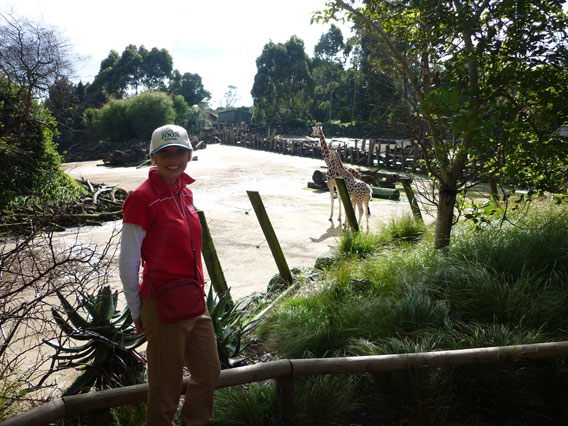
Clare Raybould at the Auckland Zoo where she volunteers. Photo courtesy of Clare Raybould.
As more and more people demand companies to become sustainable and environmentally conscious, many corporations are at a loss of how to begin making the changes necessary. If they attempt to make changes—but fall short or focus poorly—they risk their actions being labeled as ‘greenwash’. In addition, if they implement smart changes and self-regulations, but their employees don’t buy-in to the process, all their investments will be for nothing. This is where Accountability Now, a young, fresh social responsibility agency, comes in. Clare Raybould, director of Accountability Now, believes companies—large and small—have the potential to change the world for the better, but they simply need a guiding hand to change not just the way a company works, but its culture.
“I like to think that I am not like your average consultant,” Raybould told mongabay.com. “The average consultant troubleshoots, while my strategies are about changing the culture of an organization. My strategies look at managing everything holistically, my support can be taken over a good period of time and I use ‘outside of the box’ thinking to boost belief and buy-in to the positive changes that will undoubtedly occur within your operation, as you begin your journey towards becoming truly sustainable.”
Raybould—who has worked on sustainability projects as a Facilities Manager, has spent much time volunteering with NGOs in Brazil and the UK, and currently devotes time to mongabay as its translation coordinator—sees a disconnect in the corporate world between the need to move toward sustainability and the importance of collaboration. While top-down leadership is important, didactic messaging and communications imperative, a lack of focus on people and what their needs are is not beneficial to improving triple bottom line performance.
“People need to believe in the causes they are working towards if they are to make changes in their own actions,” Raybould explains. “For example, for a period of time working in my most recent position in Facilities Management I realized I was preaching. Like many other companies, I was in a situation where I was working with a small budget, with little senior management support and while my low cost strategies for energy reduction and waste minimization made sense to me because I designed them and understood their purpose, I had a mega challenge getting them to succeed at first because they relied on human participation, rather than just clever technology. When I changed my tack and incorporated participative environmental education, the strategies began working and in one year I saved my company 600,000 GBP.”
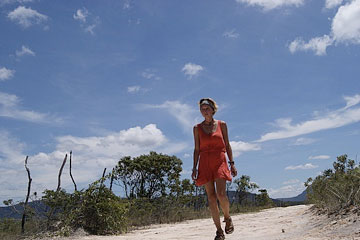 Raybould doing volunteering in Brazil. Photo courtesy of Clare Raybould. |
Sustainability need not be a dirty word for corporations. In fact, cutting energy usage, reducing waste and consumption, and improving supply chains saves companies money, and in an age where many resources are dwindling, and prices rising, using less to create more will be the future of business. When success is achieved, companies may then tout their efforts with the public.
“Many companies are already looking strategically at how environmental performance and social responsibility can have a direct, positive impact on the bottom line of an organization. Energy costs and brand concerns alone are enough to put sustainability management on the agenda of top-level executives, but professing concern and commitment and not showing that you have changed or introduced anything means efforts tend more toward the symbolic than the substantive,” Raybould says.
How to go beyond the symbolic? One way is to give back to the global community. To facilitate this, Accountability Now helps partner corporations with innovative NGOs that are in need of support. The consulting firm focuses on smaller NGOs, often in forgotten parts of the world, in order to make a real difference in environmental stewardship and social responsibility. Raybould says that such partnerships are a great way to make employees excited about the company they work for and a great influencer in building sustainability in day-to-day actions.
“The responsible partnerships specifically support change within a business and work as a driver for social responsibility and sustainability. Internally responsible partnerships motivate staff and encourage buy-in to change by making it second nature, as you confirm through your partnership that you are serious about your quality, ethical, social and environmental responsibilities. Staff also come to understand why the things you are asking of them are important and value your steps to manage your impacts. They will be inspired by your innovation, just as they will be inspired by the cause you have chosen to support and they will feel more inclined to embrace change of their own accord because they will understand the reasons behind it. The same is true externally, as responsible partnerships demonstrate a business’s values to their customers, so that customers trust the brand, because they also can see that the company takes into account their economic, environmental, ethical & social impacts including those on their doorstep,” Raybould explains.
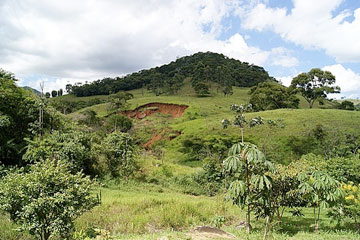 Brazil’s Atlantic Forest is largely made up of forest fragments. Photo by Clare Raybould. |
For Raybould a life-changing moment occurred while volunteering with an NGO in Brazil working to save the nearly-vanished Atlantic Forest. There she saw that there needed to be a peace agreement between corporations and the environmental movement; that balance needed to be struck between conservation and development.
“After years of being a passionate Eco Warrior, defiant that today’s world would destroy our natural environments, [I realized] development does have to and will happen—people need to live and demand will always continue, we just have to learn to live in a way that conserves our precious biomes,” she says.
Now, she’s working on making the world a better place, one business at a time.
In an August 2011 interview Clare Raybould (accountabilitynow@in.com) discusses how businesses have the power to act as a catalyst for positive change, why sustainability is important to the bottom-line, and how her consultant agency Accountability Now takes a unique approach in helping companies become sustainable and good stewards.
INTERVIEW WITH CLARE RAYBOULD
Mongabay: What’s your background?
Clare Raybould: I have a very diverse background! I studied law, psychology and languages at college and went on to graduate in Humanities from university, spending a sandwich year in Chile teaching English, where engaging values and beliefs to effect change in a very different culture was very important to the success of my role. After university I realized my passion for making positive changes in our attitudes towards how we conserve our environment, and began looking for a career that would achieve this goal.
I found myself in Facilities Management in what has transpired to be a very successful and progressive career so far, affecting many different types of industry and working my way up from administration to procurement and finally heading up my own department in sustainability. I have had the advantage of applying strategy to many business sectors and have been involved in driving change through many levels and with different types of people. I learnt very quickly that I was effective in affecting people in a positive way, but it took me a little longer to conclude that it is people and their actions that are key to sustainability and social responsibility. But such changes have to be made by choice.
Mongabay: Why did you start Accountability Now?
Clare Raybould: For this reason: I realized that how climate change will affect our businesses, communities, and environment moving forward depends on how leaders approach social responsibility and sustainability and how followers—those working within businesses and individuals—buy-in to the strategies put in place to address these areas.
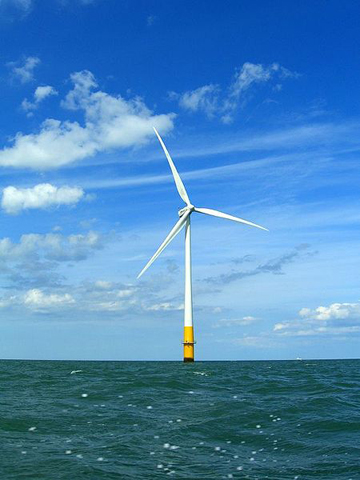 Kentish Flats wind power in the UK. Photo by: Phil Hollman. |
People in general are still deciding whether they believe climate change is real and they are certainly still figuring out what “sustainability and social responsibility” is and how it affects them, so I realized that changing the beliefs of our smart and individualistic workforce is a challenge; one that I wanted to take on in my own way, in my business.
I had also volunteered my time for many years to a variety of causes to raise awareness and make a difference, but each time I had felt frustrated that
a.) I couldn’t offer more due to work commitments and being left severely out of pocket and
b.) Greed, consumerism and demand always seemed to be in the way of any real progress made.
Businesses (and I do not mean this in an accusative way) have a big responsibility in driving demand and consumerism and certainly promote greed indirectly. The emphasis is on “more” and “better” rather than the impacts on our environments; to have more and better of everything. Business operations, the development of products, advertising, all drive our unsustainable use of the earth’s resources. It is second nature to us in this day and age, and we do not connect the actions we take to the damage being done, because it seems so far away from our day-to-day lives.
Two good things have come out of my time volunteering though, both in the UK and abroad—I have built up an impressive network of NGOs, Social Enterprises and Charities and certainly my time in Brazil taught me that while environments have suffered and are still suffering their fair share of degradation, conscience is the missing ingredient. In Brazil I found an overwhelming conscience in everyday people of the beauty and the natural value of the landscape and conscience of the things that are important, with no desire to destroy and continue to take what is not an interminable resource like water, food and land. With that has come positive and sustainable development in many areas. However those everyday people are battling big corporations that want to develop their land and even Brazil’s government has plans that are in no way sustainable (in the true sense of the word) or beneficial to environments or people. In the UK (and undoubtedly other countries) I think we feel a million miles away from these daily struggles facing Brazil’s and many other countries’ biomes, and so we continue to demand the products they provide which will ultimately destroy them.
This is where I came up with the idea of Accountability Now, a consultancy with an emphasis on education and behavioral change and the inclusion of responsible partnerships to support the development of Sustainability and Social Responsibility strategies. The responsible partnerships specifically support change within a business and work as a driver for social responsibility and sustainability. Internally responsible partnerships motivate staff and encourage buy-in to change by making it second nature, as you confirm through your partnership that you are serious about your quality, ethical, social and environmental responsibilities. Staff also come to understand why the things you are asking of them are important and value your steps to manage your impacts. They are inspired by your innovation, just as they are inspired by the cause you have chosen to support and they feel more inclined to embrace change of their own accord because they understand the reasons behind it. The same is true externally, as responsible partnerships demonstrate a business’s values to their customers, so that customers trust the brand, because they also can see that the company takes into account their economic, environmental, ethical & social impacts including those on their doorstep.
The added bonus is that the cause also benefits—via funds, other support and a raised profile, which is very important currently, as the economic downturn is seriously affecting non-profit projects’ funding.
Mongabay: What makes your business unique?
Clare Raybould: I like to think that I am not like your average consultant. The average consultant troubleshoots, while my strategies are about changing the culture of an organization. My strategies look at managing everything holistically, my support can be taken over a good period of time and I use outside of the box thinking to boost belief and buy-in to the positive changes that will undoubtedly occur within your operation, as you begin your journey towards becoming truly sustainable.
My strategies do not just consider the technology needed to improve resource efficiency—e.g. building management systems, lighting innovations, data monitoring systems etc.—or just the practicalities of changes and an improved supply chain, I look at how you encourage your staff to believe, collaborate and contribute to all of these things and only by doing this will you achieve real sustainability.
Mongabay: Can you give us an example?
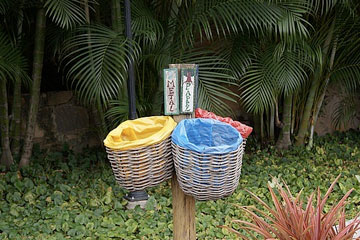 Recycling Brazilian style. Photo by Clare Raybould. |
Clare Raybould: Well, a good example is the implementation of a recycling program: what happens when your staff don’t take that extra moment to follow your new instructions to segregate waste at source? Why should a member of your staff bother to take that extra moment? What does that extra moment mean to your recycling figures? How would they be improved if all of your staff actively took that extra moment to correctly segregate and recycle by choice? I believe that efforts invested in your people are the key to improving the social responsibility and sustainability of your business. This is because if each and every person in your business, before and during implementation, doesn’t understand how the changes will make a difference, what they are for and the fact that their CEO believes in them, you are simply pouring money down the drain.
Mongabay: Why do you believe behavioral changes among workers are imperative to achieving true sustainability in the private sector?
Clare Raybould: Because at the foundation of sustainability is what people believe, say and do.
People need to believe in the causes they are working towards if they are to make changes in their own actions. For example, for a period of time working in my most recent position in Facilities Management I realized I was preaching. Like many other companies, I was in a situation where I was working with a small budget, with little senior management support and while my low cost strategies for energy reduction and waste minimization made sense to me because I designed them and understood their purpose, I had a mega challenge getting them to succeed because they relied on human participation, rather than just clever technology. When I changed my tack and incorporated participative environmental education, the strategies began working and in one year I saved my company 600,000 GBP.
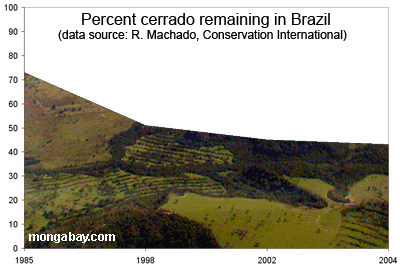 Biofuels driving destruction of Brazilian cerrado The cerrado, wooded grassland in Brazil that once covered an area half the size of Europe, is fast being transformed into croplands to meet rising demand for soybeans, sugarcane, and cattle. The cerrado is now disappearing more than twice as the rate as the neighboring Amazon rainforest, according to Ricardo Machado, a Brazilian expert on the savanna ecosystem. |
The belief behind this approach was cemented in 2010 when I went to Brazil to undertake research. I saw first-hand how important perceptions of environments and the problems within them are, and how we need to understand how we are so intricately connected to them. For example, the Brazilian Savannah (cerrado), is one of the most stunning and important landscapes in Brazil. It is already being seriously degraded through farming—the soya bean mostly, but also biodiesel and ethanol—and is actually the biome that is disappearing the fastest from Brazil. 1.5 percent, 30 million hectares—equivalent to 2.6 football fields per minute—of the cerrado disappear from Brazil every year, much more and a lot quicker than in the Amazon. Yet many people do not know much or anything about this area, even though it is a worldwide biodiversity hot spot; 1/3 of Brazil’s diversity lives within it. Experts forecast that by 2030 there will be nothing left of this precious place and with it the wealth of animals that live there will be gone. Some are already endangered, for example the jaguar especially, just like in the Atlantic Forest and the Amazon. While there are campaigns to conserve the cerrado and there are nationally protected parks too, like Chapada dos Verdeiros, the struggle of Brazil’s cerrado and the reasons behind it are still unknown to many.
Why? You tell me! I don’t have all the answers, but much is to do with communication. The companies promoting the use and ‘benefits’ of biofuels and soya have a responsibility to let consumers know where their products come from and the impact of growing them, so that consumers can make responsible purchasing choices. But the companies also desire to stay in business, so there needs to be a balance, a compromise. We are seeing it now with the Amazon— companies like Sky taking advantage of the focus on this struggling ecosystem and using conservation as part of their marketing, which at least raises awareness and encourages positive changes. The cerrado needs just as much protection as the Amazon in order to increase biodiversity and combat climate change, but the Amazon continues to grab headlines around the world. Brazil has many other important areas for wildlife and climate change that should not be overlooked either. My time away in Brazil included one month spent working at the Iracambi Research Centre in the Atlantic Rainforest, on developing a Communications Strategy. They had a splendid idea that they just couldn’t get off the ground for a variety of reasons, a principle one being funding, but also the fact that many had not heard about the struggles of their rainforest and as such, when they were looking for mutually lucrative commercial partnerships, they had little success. Their idea was to get businesses to purchase plots of land, which Iracambi would then reforest. The situation in the Atlantic Forest is that many areas of land are owned by local farmers (rather than big businesses like in the Amazon) and although the land is really poor for farming (in fact, after a period of years it is no good at all) they need it for their subsistence, so it is still exploited. Some farmers, even at the point where the land becomes redundant, are still unwilling to sell through pride or because they intend to pass it down as inheritance to their children, but a big enough amount of them do want to sell and under Iracambi’s ownership the land would be protected and safe from further degradation and can even be reforested. My job was to look at how the idea could be marketed and who it should be marketed to, so that Iracambi could establish commercial partnerships and had a business model that is sustainable ongoing, especially if the economic downturn continues. Iracambi are not exempt from the economic difficulties affecting everyone else. Higher costs and fewer students actually forced the Research Centre to close for the last quarter of 2010; a devastating reality considering the project is doing such good and necessary research and building solid relationships with communities that are the key to sustainable development. I concluded that to secure funding and people for the long-term, Iracambi needs a corporate partner to develop a scheme, perhaps similar to that which Sky has in place for the Amazon. Iracambi needs to attract enough funding to ensure a smooth transition for the NGO and an exemplary marketing strategy to secure the future of the Research Center, so that they can inspire more people to work with them in saving forests and changing lives. However, the Amazon has a certain advantage over the Atlantic because its plight is visible already and certain organizations’ routes to aiding the problem are clear. More than anything the world understands the problems facing the Amazon now, or mostly, which makes Sky‚Äôs job a lot easier and looks amazing for their corporate responsibility. The sad thing about the Atlantic is that if anything the forest has a much greater need for support, just like the cerrado, as there is so much less left of it to destroy, but any partnership will have to work a lot harder to effect benefits for both sides. Innocent, the popular fruit drinks company, did at one point get involved to support Iracambi, but with undefined objectives of the partnership on both sides, that also fell through.
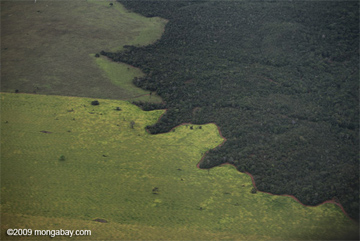 Conversion of cerrado for cattle pasture. Photo by: Rhett A. Butler. |
That is where I believe that Accountability Now fits in, aligning the business strategy so that it manages its environmental and social impacts, so that it has the capacity to still be doing business in the future and places a responsible partner at the foundation of any strategy to achieve Social Responsibility and Sustainability in a way that also meets the needs of the non-profit partner. Clearly this considers economics on both sides, makes Accountability Now profitable as a business, but doesn’t mean responsible partnership equals solely an expensive sponsorship. Many companies are already looking strategically at how environmental performance and social responsibility can have a direct, positive impact on the bottom line of an organization. Energy costs and brand concerns alone are enough to put sustainability management on the agenda of top-level executives, but professing concern and commitment and not showing that you have changed or introduced anything means efforts tend more toward the symbolic than the substantive.
Mongabay: Why does the example of top corporate officials showing environmental awareness matter?
Clare Raybould: Because top level corporate officials also need to believe and drive that belief through every level of their business! Accountability Now supports this step-change and helps build, clarify and achieve business social responsibility and sustainability goals.
Mongabay: How do we balance human needs and consumption patterns while still preserving the environment for the next generation?
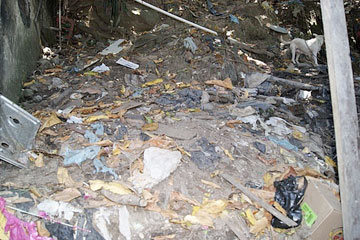 Waste in the slums of Rio de Janeiro. Photo by Clare Raybould. |
Clare Raybould: Good question! Iracambi was an amazing experience for me, it made me realize, after years of being a passionate Eco Warrior, defiant that today‚Äôs world would destroy our natural environments, that actually development does have to and will happen—people need to live and demand will always continue, we just have to learn to live in a way that conserves our precious biomes.
I spent a lot of time researching in Brazil once I had left Iracambi, I wanted to find effective ways to educate the importance of sustainability and communicate it, so that people understand how to change their actions day to day and contribute to a sustainable future for our children and their children and preserve our beautiful and precious environments. In my cabin at Iracambi I had a poster on my wall that had a picture of a Jaguar upon it that said “EXTINCT—Once Gone, Gone Forever”, I wondered how could people forget that with all the campaigns and clear facts and figures? The answer: it is difficult to appreciate how your personal actions affect this degradation until you see it. Until you appreciate and understand how your actions are linked, and how the degradation then links back to how you may have to live your own life moving forward. In essence, what is the impact of the jaguar’s extinction on my life and your life? How do the actions you take increase the likelihood of extinction and perhaps more importantly, why would a change in consumer choice or recycling, saving water and electricity make any difference at all? Not everyone can take time out and live in Brazil! So, we just need to think more innovatively about how we can bring the experience I had in Brazil and the impact it made on my life choices to them…
Mongabay: What do companies receive in terms of benefits for choosing better environmental practices?
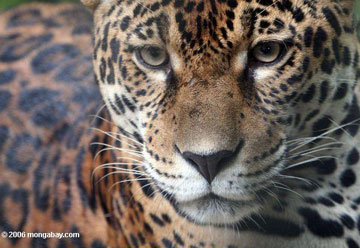 A jaguar. Photo by: Rhett A. Butler. |
Clare Raybould: The essence of responsible business is shifting. Conserving natural resources and minimizing impact on the environment isn’t just a legal requirement anymore, it is what is expected of you by your stakeholders; it affects the core operation of your business, determines its ability to continue and shapes the reputation of your business as a whole. Both social responsibility and sustainability cannot just be policies on your website and in company documents anymore, they mean actively implementing Social Responsibility and Sustainability programs and measures to minimize your environmental impact, through increased efficiency, reduction in electricity and water consumption, improved air quality, increased recycling and reduction of waste and reporting. All of these measures are expected to be an integral element of your company’s operation if you are to keep up with the competition and meet the growing number of consumers interested in the environmental and social impacts of their purchases.
Of course there are advantages for the business also—reduced operational costs, employees educated to decrease their own carbon-footprints and even further reaching social and environmental positive impacts facilitated through the responsible partnerships.
However there is the challenge of how to raise awareness of the good things that you are doing also, so that it reaches the people buying and using your products and services. This is why my support also looks at your communications strategy, links in with your marketing and ensures your social responsibility story stands out.
Educating supply chains of your green policies and increasing the visibility of your green choices are also challenges, alongside out-maneuvering the potential impact of another global financial crisis, in order to set you apart from your competition and ensure your business enjoys top-of-the-mind awareness among customers, both existing and potential. These are all challenges that Accountability Now can support.
Mongabay: Why is sustainability important not just for big corporations, but small and medium sized ones too?
Clare Raybould: In January this year, in the first month of Accountability Now as an idea, I set up my first partnership, between Northfield Car Care Centre (NCCC) a small operation of 5 staff in the UK and Giveacar (www.giveacar.co.uk), a budding UK initiative that raises money for UK registered charities by organizing the donation of proceeds from the sale or scrap of old cars. The partnership raises funds for Northfield’s resident and important Ecocentre and promotes efficient driving, as well as facilitating better environmental management onsite. Philanthropy isn’t often something you connect with garages, so for Accountability Now this posed a refreshing challenge. For Giveacar, the partnership is hoped to pave the way to working with more garages, as Accountability Now works to roll this successful scheme out nationwide. Positively, more than 300 charities across the country have already benefitted from Giveacar’s work that has until now been working domestically. ¬£175,000 has been raised in total so far for Giveacar’s affiliated list of charities and with the UK Vehicle and Operator Services Agency (VOSA) confirming that each year 37 percent of cars and light vans fail their MOT, even though many of these only require small repairs to pass and return to the road, the endeavor comes at a good time. 2011 has seen the introduction of an Efficient Driving Campaign for NCCC’s customers presented as part of a full Social Responsibility Program to raise awareness of the impact of scrap metal waste and other garage wastes and the importance of increasing the life of cars. The Waste Management Program, including a new contract with Eco Oil, will ensure all other waste is managed responsibly and is reused and recycled, with the oil for example being taken through a process that turns it to oil that can be used again and tires being turned into the base for playgrounds.
I hope this partnership may signal a shift in SME engagement in social responsibility because it proves it is achievable, affordable and important. When I established Accountability Now I envisioned my first partnership being with a big corporation, those you traditionally see working with Consultants on CSR and Sustainability, but all sectors of business have come under increasing pressure in recent years to demonstrably engage in these activities. Research is showing a recognition of the growing significance of the SME sector across the world, which has led to an emphasis on their social and environmental impact and consumers are making their choices based on reputation for social and environmental responsibility, whether the business is large or small.
Mongabay: When companies are looking to pursue sustainability, why should they choose Accountability Now?
Clare Raybould: Accountability Now is a unique approach, which integrates innovation, behavioral change, development, partnership and transparency and markets the success achieved in a responsible, accountable way. Accountability Now will always go the extra mile and is also not just about business, it is a way to engineer change and contribute to causes directly, an area about which I am very passionate! In April this year, Accountability Now ran its own charity event “Kickbox for Kiwis” to raise money for the relief effort in Christchurch, New Zealand. The ‘sparathon’ saw 50 fighters sparring non-stop for 100 rounds and raised over 1200 GBP! Sponsorship money is still coming in from participants, but I will be sure to publish the final total on my website.
Mongabay: Your organization has moved to New Zealand. How do you see Accountability Now fitting in to the New Zealand business environment?
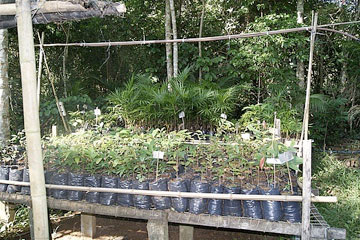 Baby trees for reforestation effort at Iracambi in the Atlantic Forest. Photo by Clare Raybould. |
Clare Raybould: We actually arrived in Auckland 5 weeks ago and it has been a whirlwind ever since! I am thrilled because New Zealand is a country where the majority of businesses are small firms, which fits my business plan perfectly. The ‘kiwis’ are also so welcoming and willing to discuss my business with them and many doors have already opened. There is still work to do though, to establish myself and prove that I can provide a dedicated, flexible and affordable service to firms that might not have considered social responsibility programs achievable before. In this respect I am working for another garage and am looking at a social responsibility program that sponsors the development of art in schools to promote the reduce, reuse and recycle message, with the art being exhibited on an online gallery to spread this message far and wide.
I am also looking to work with large corporations though, Accountability Now can simplify the social responsibility and sustainability process, break it down and provide a framework that begins with identifying the environmental and social impacts and embarking on addressing them using a systematic approach to setting objectives and targets and supporting the business journey to achieving them. I am excited about the projects I will be working on in New Zealand, both personally and professionally and the ways in which I can make a difference! To ensure I am promoting my own business’ commitment to social responsibility I am dedicating one day a week to volunteering for Auckland Zoo, to promote their own important conservation messages and programmes that need funding.
Mongabay: Does Accountability Now offer services remotely?
Clare Raybould: Yes definitely. For a full list of my services, or to discuss potential business opportunities and responsible partnerships both in New Zealand and abroad, or just more information about Accountability Now, please email me accountabilitynow@in.com.
I am so excited about the future of my company. Accountability Now has proved to me that how I want to live my life is achievable and how I desire to help the causes I am so passionate about is possible. Friends and family have always said to me that ‘I can’t save the world’, but I don’t want to, my goal with Accountability Now is simply to do my part to preserve what is so precious for my children and at the same time make a positive difference to companies looking to reduce carbon emissions and environmental/social impact. And the best part is that I love what I do! Work is no longer work, as I enjoy spending time with clients to meet their Sustainability and Social Responsibility goals. In return for letting me inside their business and trusting me, I get to positively influence the future of their company and make a difference to important projects all over the world.
Related articles
Fuji Xerox Australia dumps paper supplier accused of rainforest destruction
(08/05/2011) Fuji Xerox Australia have severed ties with Asia Pacific Resources International (APRIL), an paper products giant accused of illegally clearing rainforests in Sumatra for pulp and paper production, reports Nine News.
Adaptation, justice and morality in a warming world

(07/28/2011) If last year was the first in which climate change impacts became apparent worldwide—unprecedented drought and fires in Russia, megaflood in Pakistan, record drought in the Amazon, deadly floods in South America, plus record highs all over the place—this may be the year in which the American public sees climate change as no longer distant and abstract, but happening at home. With burning across the southwest, record drought in Texas, majors flooding in the Midwest, heatwaves everywhere, its becoming harder and harder to ignore the obvious. Climate change consultant and blogger, Brian Thomas, says these patterns are pushing ‘prominent scientists’ to state ‘more explicitly that the pattern we’re seeing today shows a definite climate change link,’ but that it may not yet change the public perception in the US.
Lego banishes Asia Pulp & Paper due to deforestation link

(07/07/2011) In response to a campaign by Greenpeace asserting that packaging used for its iconic toy building blocks is contributing to deforestation in Indonesia, the LEGO Group on Thursday announced it is taking steps to reduce the environmental impact of packaging materials and paper used in its products.
Profit, not poverty, increasingly the cause of deforestation
(06/13/2011) A new report highlights the increasing role commodity production and trade play in driving tropical deforestation.

(06/12/2011) While few would question that conserving a certain percentage of land or water is good for society overall, it has long been believed that protected areas economically impoverish, rather than enrich, communities living adjacent to them. Many communities worldwide have protested against the establishment of conservation areas near them, fearing that less access and increased regulations would imperil their livelihoods. However, a surprising study overturns the common wisdom: showing that, at least in Thailand and Costa Rica, protected areas actually boost local economies and decrease poverty.
Shipping firm pledges to disconnect itself from rainforest destruction
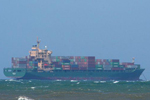
(05/25/2011) The Danish shipping giant Maersk pledged this week to stop purchasing containers with floors made from uncertified tropical hardwood, reports Deutsche Welle press. In an effort to reduce illegal logging and combat climate change, the company will be turning to recycled plastic, bamboo, and tropical wood certified by the Forest Stewardship Council (FSC) for its flooring. The Copenhagen-based firm is the first cargo company to transition to ‘green containers’ as part of a sustainable business strategy.
Dutch buy first ‘responsible’ soy sourced from the Amazon
(06/08/2011) The Dutch food and feed industry has bought the first soy produced under the principles of the Round Table on Responsible Soy (RTRS), a body that aims to bring more socially and environmentally sustainable soy to market.
(05/23/2011) Last week the 3rd Nobel Laureates Symposium on Global Sustainability concluded with participants—including 17 past Nobel Prize winners and 40 other experts—crafting and signing the Stockholm Memorandum. The document calls for emergency actions to tackle human pressures on the Earth’s environment while ensuring a more equitable and just world.
Is Indonesia losing its most valuable assets?

(05/16/2011) Deep in the rainforests of Malaysian Borneo in the late 1980s, researchers made an incredible discovery: the bark of a species of peat swamp tree yielded an extract with potent anti-HIV activity. An anti-HIV drug made from the compound is now nearing clinical trials. It could be worth hundreds of millions of dollars a year and help improve the lives of millions of people. This story is significant for Indonesia because its forests house a similar species. In fact, Indonesia’s forests probably contain many other potentially valuable species, although our understanding of these is poor. Given Indonesia’s biological richness — Indonesia has the highest number of plant and animal species of any country on the planet — shouldn’t policymakers and businesses be giving priority to protecting and understanding rainforests, peatlands, mountains, coral reefs, and mangrove ecosystems, rather than destroying them for commodities?
Avon commits to greener palm oil
(04/15/2011) The beauty products giant Avon will purchase enough GreenPalm certificates to meet 100 percent of its palm oil use.

(03/11/2011) McDonald’s announced a far-reaching sourcing policy that could significantly reduce the fast-food giant’s impact on the environment, including global forests. Yesterday McDonald’s unveiled its Sustainable Land Management Commitment, a policy that requires its suppliers to use ‘agricultural raw materials for the company’s food and packaging that originate from sustainably-managed land’.
Kellogg switches to ‘greener’ palm oil
(03/08/2011) Kellogg Company will support greener palm oil production through the purchase of ‘sustainable’ palm oil certificates until it can obtain a segregated, sustainable supply, said the food giant in a statement.
Green jeans: big companies start sustainable clothing initiative
(03/06/2011) Ever wonder how ‘green’ one pair of shoes was over another? Or how much energy, water, and chemicals went into making your pair of jeans? A new effort by over 32 companies, environmental organizations, and social watchdogs may soon allow shoppers to compare not only price and appeal, but sustainability too.
Breakthrough? Controversial palm oil company signs rainforest pact

(02/09/2011) One of the world’s highest profile and most controversial palm oil companies, Golden Agri-Resources Limited (GAR), has signed an agreement committing it to protect tropical forests and peatlands in Indonesia. The deal—signed with The Forest Trust, an environmental group that works with companies to improve their supply chains—could have significant ramifications for how palm oil is produced in the country, which is the world’s largest producer of palm oil.
Nike and Kimberly-Clark lead the corporate pack on forest sustainability
(01/27/2011) Forest Footprint Disclosure (FFD), which asks international companies to reveal their impact on forests around the world, has released their second review. From biofuels to travel to media, FFD named corporate leaders in 19 categories, including Kimberly Clark for Personal-Household products and Nike for Clothing, Accessories and Footwear.
Sales of RSPO-certified palm oil surge 225%
(01/10/2011) Sales of palm oil certified under the leading sustainability standard surged 225 percent in 2010, suggesting growing consumer interest in more responsibly-sourced palm oil.
Brazil’s largest national bank signs zero deforestation pact for Amazon soy
(12/03/2010) Banco do Brasil, Brazil’s largest state-owned bank, announced it has joined a zero deforestation pact for soy grown in the Amazon. The bank will now require farmers applying for credit to certify the origin of their soybeans.
Consumer goods industry announces goal of zero deforestation in Cancun
(11/30/2010) While governments continue to stall on action to cut greenhouse gas emissions worldwide, global corporations are promising big changes to tackle their responsibilities. The Board of Consumer Goods Forum (BCGF) has approved a resolution to achieve net zero deforestation by 2020 in products such as palm oil, soy, beef, and paper. Announced yesterday at the UN Climate Summit in Cancun, the BCGF has stated the goal will be met both by individual actions within companies and collective action, including partnerships with NGOs, development banks, and governments. With such giants as Walmart, Unilever, Carrefour, and General Mills, BCGF is made up of four hundred global consumer goods manufacturers and retailers totaling over $2.8 trillion in revenue.